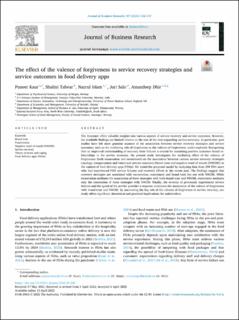The effect of the valence of forgiveness to service recovery strategies and service outcomes in food delivery apps
Journal article, Peer reviewed
Published version

Åpne
Permanent lenke
https://hdl.handle.net/11250/3001983Utgivelsesdato
2022Metadata
Vis full innførselSamlinger
Sammendrag
The literature offers valuable insights into various aspects of service recovery and service outcomes. However, the available findings are limited relative to the size of the ever-expanding service economy. In particular, past studies have left more granular nuances of the association between service recovery strategies and service outcomes, such as the mediating role of forgiveness or the valence of forgiveness, under-explored. Recognising that an improved understanding of recovery from failures is crucial for sustaining positive customer–brand relationships in the service economy, the present study investigates the mediating effect of the valence of forgiveness (both exoneration and resentment) on the association between various service recovery strategies (apology, compensation and voice) and service outcomes (brand trust and negative word of mouth [NWOM]) in the context of food delivery apps (FDAs). We tested the proposed model by analysing data from 294 FDA users who had experienced FDA service failures and recovery efforts in the recent past. The findings suggest that recovery strategies are associated with exoneration, resentment and brand trust but not with NWOM. While exoneration mediates the association of these strategies with both brand trust and NWOM, resentment mediates only the association of these strategies with NWOM. Finally, the severity of previously experienced service failures and the speed of the service provider’s response moderates the association of the valence of forgiveness with brand trust and NWOM. By uncovering the key role of the valence of forgiveness in service recovery, our study offers significant theoretical and practical implications for stakeholders.
